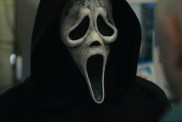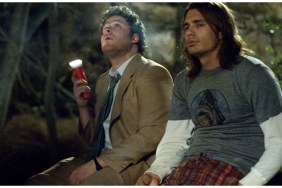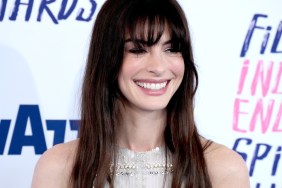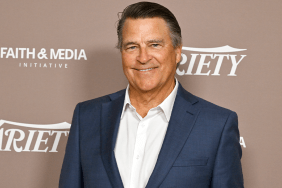While many great movies are released every year, not all of them feel “special” in that they have the same impact every time you see them, though for the life of you, you can’t figure out why. That’s certainly the case with Sean McGinly’s The Great Buck Howard, which we first saw at the Sundance Film Festival last year.
It stars John Malkovich as the film’s title character, a flamboyant master of sleight of hand and mentalism whose heydays are mostly behind him. Colin Hanks plays Troy, a wannabe writer who takes a job as his road manager and finds himself dealing with all of Buck Howard’s eccentricities. Maybe it’s the fact that the Troy character and his situations come from McGinly’s own personal experiences working for The Amazing Kreskin that makes the film resonate so well, but certainly the perfect casting of those two actors in those roles has a lot to do with why the movie does feel special.
ComingSoon.net got on the phone with McGinly last week to talk about his movie, then a few days later, we talked to his star Colin Hanks. (That interview you can read here.)
ComingSoon.net: I know that the entry point for this film was the Amazing Kreskin, though I don’t think I really knew how he influenced this script.
Sean McGinly: The first ten minutes of the film are pretty much exactly what happened in my life. I just randomly and cluelessly wound up working for Kreskin when I was 22 years old, which was like 14 years ago, for about four months. It was a very similar experience to the one the character has in the film. After about the ten-minute mark, everything starts to veer off into the fictional, but I did spend four months working as Kreskin’s road manager and personal assistant.
CS: Was he performing at similar venues?
McGinly: Yeah, that was kind of the inspiration for it, was that I began to see that we were playing in these towns that I didn’t even know entertainers were traveling to these places, and when we were there, they’d also tell me “so and so was here last week” and I’m like, “I remember him, kind of vaguely, from years and years ago” and I began to realize there was a C-level or D-level circuit where these guys performed and you saw how seriously Kreskin took it and how much it meant to him. You also saw that he was very good, very talented, and it kind of occurred to me that he’d been very big at one point and now he wasn’t. It was interesting to me that he was still doing the same thing he’s always done and for whatever reason, he was playing here rather than in Vegas or Atlantic City or some of the places he’d been before.
CS: Kreskin isn’t nearly as flamboyant as Buck Howard, so did you try to combine him with other people you met on the road? Or was it just a matter of finding the archetype of those entertainers?
McGinly: It was kind of an archetype. Over time, the character became its own thing, and of course, you want to play up some of the things for comedic value. Malkovich got a hold of the character and really took it to a different level altogether again, ’cause he really wanted to play up a lot of the craziness and silliness, so it became someone quite different from what Kreskin was like just in the normal way any character will evolve.
CS: Have you stayed in touch with Kreskin or was he involved as a consultant for the movie?
McGinly: I quit after four months working for him, and when I quit, it was 1994, and I never spoke to him again. He had nothing to do with the film. I know that some sort of agreement had to be struck with him so that there’s a disclaimer at the end of the film. It’s there just to get his approval to do it.
CS: I don’t remember the disclaimer at the screening I saw at Sundance.
McGinly: There was a disclaimer at the very, very end. We were still in negotiations. Now there’s a disclaimer at the end of the film. It used to be at the end of the credits.

CS: Was this story something you’ve had in your mind those 15 years since you stopped working for him that you decided to finally develop?
McGinly: For years I would tell the stories of having worked for Kreskin at parties and stuff, and it was always something people got a kick out of. A good friend of mine for years was saying, “You really oughtta write this, there’s a story here,” and I finally took him up on it. I wrote the first draft of this script, I think it was 2003 or 2004 and it just took a long time to get the film made. It took three or four years of trying to put it together, to finally get the financing and cast, for it to all come together. As you know, the film took awhile to come out once we got it done.
CS: How did the Hankses get involved with the movie?
McGinly: Colin was the first one on. We sent the script to Colin and he agreed to play the role, and then we asked him if he’d show it to Playtone, which is Tom’s production company, to produce it. He kind of told us that he’d sent stuff before and they’d never liked anything he sent them, and for us not to get our hopes up, but they agreed to produce it and helped us trying to find the money. Somewhere in the process, and I never even asked ’cause I just didn’t think it was possible, Tom said he wanted to play the role of the father even though it was only two scenes, so we were like, “Fantastic!”
CS: How far into the process did you start thinking of Malkovich to play the main character?
McGinly: We kind of had the whole film put together and we were just thinking of casting choices and I’m not sure why his name hadn’t come up, but I think maybe we thought he might have been too young. Somebody suggested him and when they suggested him, we all kind of looked at each other and said, “That’s not a bad idea” and went ahead and offered it to him and he accepted. Once we got that wig on him, he just kind of became Buck Howard.
CS: Did he have any prior experience of magic or sleight of hand beforehand?
McGinly: Nothing like that. I don’t think the magic is what drew him to it. He told me that he was fascinated by the character because he thought it was funny that he was such a narcissist. He said he got a kick out of (that) and seemed to enjoy that part of the character. He really did seem to enjoy it. I have to say that every day was fun to watch him and he kept coming up with new and funny things that just made me feel like he’s really the best and he had a good time with this character.
CS: There’s also something really entertaining about watching him flip out in movies. He must realize that people like that part of his characters at this point.
McGinly: I kind of wish we had more scenes of him going off on Troy, because to this day–and I’ve seen the film a zillion times as we edited it from six to eight months–and it just cracks me up every time you see John as Buck Howard screaming and yelling. It’s endlessly funny to me.
CS: The amazing thing about Buck is that even though he’s a jerk towards Troy, by the end you really feel for him, something I experienced both times I’ve seen it. I was curious how you and John worked on getting this character who has the potential to be so dislikeable to actually be liked.
McGinly: Yeah, I think that’s all a testament to John’s acting. That’s the thing we talked about, that I thought about so much in writing the script and in pre-production and through so many conversations with the company that financed the film. Them concerned that “he’s not going to be likeable” or “he’s so much of a jerk that no one’s going to like him” and from the first time I screened a rough cut to friends of mine, everybody has liked Buck Howard. Once the movie was shot and cut together, we never spent five seconds trying to find a way to get people to be more engaged, more interested and more sympathetic to Buck. I think that’s what you get when you have someone as good as John Malkovich playing a role. He’s interesting. That’s why he’s John Malkovich I think. He’s someone you want to watch and he just has this amazing presence that makes you feel compelled by whatever he’s doing even when he’s playing a jerk.

CS: Did you happen to see the Don Rickels doc on HBO?
McGinly: Of course! I loved it, it was great!
CS: I was just wondering because there were aspects of Buck’s personality, in terms of tipping, which seemed to be very true to those Vegas entertainers, although there was no way you could have seen that before making this. Had you heard similar stories that you were able to use?
McGinly: I hadn’t heard anything like that. I think I just made it up. Kreskin was a good tipper but it just became a funny bit in the writing of it and John took it even further that Buck was really cheap. Anything really silly like that, he loved and embraced, and he probably improvised a few other times where he made him even more cheap. Somehow that really tickled me.
CS: Is there a lot of that kind of stuff that we might eventually see on a DVD?
McGinly: There’s tons of that stuff. I’m trying to get them to let us put that in there, because there’s tons of outtakes with stuff John improvised which is really funny. There are millions of Malkovich outtakes that are really funny.
CS: The whole cast is great, but getting Emily Blunt so soon after her post-“Prada” success was very fortuitous. What were you hoping her character, a New York publicist, would bring to the mix?
McGinly: When I was just doing it myself, there was never a PR woman I had an affair with or anything like that, but I remembered when I took the job, there’d be these times when you were doing a lot of work and there’s something about being on the road and you’re working with somebody, you kind of just forget about the rest of the world. You get into your own bubble of working with this person and going to these places, and I just felt she was somebody who could come in from the real world and remind him that there is a world out there besides this world he’d gotten stuck in. I thought she could bring that, and also she’s also a rescue from Buck, like a pretty girl from New York who kind of rescues him from this craziness of being with Buck Howard all the time.
CS: On the technical side, you did film in a lot of different venues, so did you end up doing a lot of traveling or just found places around California where you could shoot?
McGinly: We shot it all in the Los Angeles area, all around L.A., so were in downtown, Long Beach, the Crenshaw district, in the Valley. We just went all over the place to find different looks and especially to find different theaters.
CS: I was more amazed that you could find extras in L.A. that looked like small town audiences… that you could find that many normal-looking people in L.A.
McGinly: I know! There’s tons of them. Our extras casting person really did a great job with that and we told her exactly that. “We don’t want anyone here who looks like they’re an actor. We want people who look like regular normal people.” When they’d show up, I was like, “Wow, these extras are amazing.”
CS: I wanted to ask about some of Buck Howard’s television appearances in the movie. What were some of the logistics of doing some of those shows?
McGinly: We really had to put the word out to everybody that we really had to get on these shows, because it’s going to be really funny and it’ll be a really cool moment. I think Colin had contacted Conan and our line producer had a contact at “The Daily Show” and I think we got Tom’s assistant to make a call to Jay Leno. I think it was using the connections we had and also all these people wanting to work with Malkovich or they had John on their show. Everybody was really cooperative and really got that it was going to be a funny thing to do. John and Tom and Colin Hanks paved the way, just because people had good experiences with them and wanted to be helpful.

CS: So you just went in after they finished taping those shows and did a few extra minutes with John in character?
McGinly: That’s exactly what it would be like. As they were finishing their show and then very quickly, we’d hop in and told the camera guys to shoot it as if it’s really happening on your show. I think the longest one we spent on was John Stewart. He gave us some time so we spent 20 to 25 minutes doing all kinds of weird stuff. In terms of “Regis and Kelly” that was like five minutes. As soon as the show was over, right in, they did it in one take, done.
CS: You realize that if this were a studio movie, they’d probably have Malkovich go do those shows for real in character. I somehow doubt he’d agree to it but that almost seems like the best way to get the word out on the movie.
McGinly: Yeah, I think that was thrown out there. I don’t know if he didn’t want to do it or maybe he’s still going to do it, I don’t know. Unfortunately, I’m not involved in any of the marketing, so I don’t know what’s going to happen. (chuckles)
CS: I also wanted to ask about avoiding too much talk about Buck Howard’s sexuality. It’s discussed a bit between characters, but you never really make it a big part of the character.
McGinly: (laughs) Yeah, I just thought it would be a funny running gag if everyone was always wondering if Buck was gay. I don’t know if he is or not. I just thought it was a funny thing that people were always wondering that.
CS: What have you been working on since finishing this movie before Sundance last year? I know you also do rewrites for scripts in Hollywood as well?
McGinly: Whatever job I can get. I wrote a pilot for Fox last year that didn’t wind up getting picked up, so there’s that kind of stuff, and I’m always trying to get another movie made. I wrote this script, I adapted this book called “Karoo” by Steve Tesisch, so that’s the thing I’m trying to get going next. “Buck” was the same story. It’s a tough thing getting together the money, so hopefully that will be the next one.
CS: Do you generally just write stuff for you to direct or do you do a lot of writing for others and how do you balance the two things?
McGinly: If there’s something that I really love and I really feel strongly about and it’s personal than that’s something I’ll write and try to get made. Aside from that, it’s just anything I can get to pay the bills.
The Great Buck Howard opens today, March 20, in select cities, and it’s also available where other Magnolia Video on Demand films are shown.









